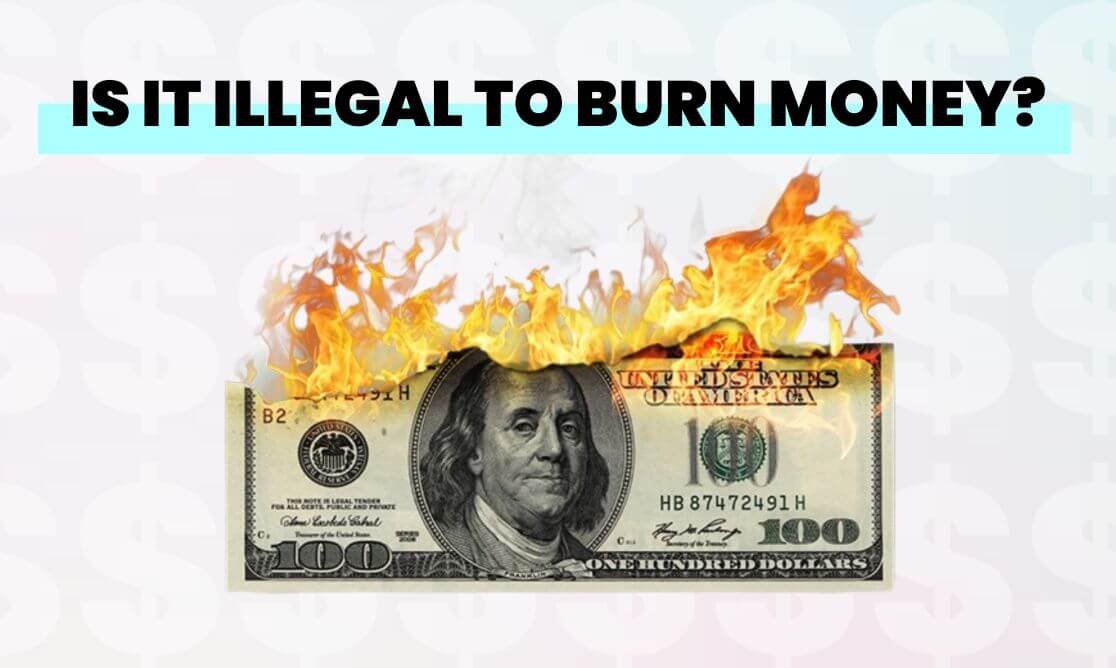Whilst it's legal for government to burn through billions of tax dollars on meaningless projects, random non-governmental agencies, and foreign wars, it's not legal for a citizen to burn US dollar bills.
Find out what the law says about the burning of US currency and the potential consequences of doing so.

Coming up next
Key takeaways
- Burning money in the US is illegal under 18 USC § 333 and carries a potential punishment of up to six months in jail.
- The law applies to any currency issued by the United States government, regardless of the country in which it is burned.
- Intent is critical in determining whether or not burning money is illegal. Accidentally burning money would not be considered a violation of 18 USC § 333 as long as there was no intent to render the money unusable.
What the law says about burning money
According to Title 18, Section 333 of the United States Code, it is illegal to mutilate, deface, disfigure, or destroy currency with the intent to render it unfit for circulation. Burning US dollar bills is unlawful if the objective is to render the money unusable.
This is specifically what the law says on the issue:
Whoever mutilates, cuts, defaces, disfigures, or perforates, or unites or cements together, or does any other thing to any bank bill, draft, note, or other evidence of debt issued by any national banking association, or Federal Reserve bank, or the Federal Reserve System, with intent to render such bank bill, draft, note, or other evidence of debt unfit to be reissued, shall be fined under this title or imprisoned not more than six months, or both.
Is it a felony to burn money in the US?
Burning money intending to render it unusable is considered a felony under federal law. The punishment for this crime can include a fine, up to six months in prison, or both.
What's the punishment for burning US money?
The punishment for burning US money can include a fine, up to six months in prison, or both. The severity of the punishment will depend on the case's specific circumstances, such as the amount of money burned and the intent behind the act.
It's worth noting that burning money as part of a political statement or protest is still illegal, but it may be considered a form of free speech and handled differently in court.
FAQs
Is it illegal to burn money just for fun?
Burning money for fun would still be illegal as the intent is to render the money unusable, and the act falls under 18 USC § 333.
Can I burn money as part of a protest or political statement?
Burning money as part of a protest or political statement is still illegal, but it may be considered free speech and handled differently in court. However, it would be a good idea to consult a legal expert before engaging in such an act.
How much money can I burn before it's considered a federal crime?
Any amount of money that is destroyed with the intent to render it unusable can be regarded as a violation of 18 USC § 333.
If I accidentally burn money, am I still breaking the law?
Accidentally burning money would not be considered a violation of 18 USC § 333 as long as there was no intent to render the money unusable.
Is it legal to burn old or damaged currency?
Burning old or damaged currency would not violate 18 USC § 333 as long as there was no intent to render the money unusable. However, it's worth noting that destroying currency still deemed legal tender regardless of its condition is illegal.
How is intent determined in cases of burning money?
The circumstances surrounding the act of burning money are what determines intent. For example, statements made by the person who burned the money and the actions taken before, during, and after the money was burned.
Are there any exceptions to the law against burning money?
There are no specific exceptions to the law against burning money. However, in some cases, burning money may be considered a form of free speech and handled differently in court. Burning money as part of a religious or spiritual ceremony may also be an exception.

